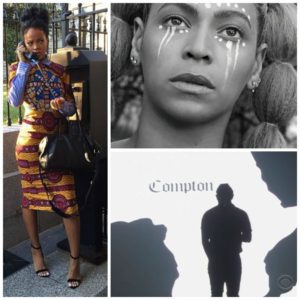
Instagram/Parkwood Entertianment/CBS
While many artists have begun to embrace African culture in their songs and music videos, one blogger wondered why those same performers don’t visit supportive fans in other countries besides South Africa – like Nigeria, Morocco and Kenya.
Ghanaian-UK writer Joel Ryan boldly questioned why many Black artists heavily borrow from their roots to the motherland in their work yet refuse to tour on the continent.
Ryan points out that many performers travel to western countries – those that have roots in Europe. He believes worries about music venues, politics and safety could be to blame but notes that many countries are capable of handling major acts.
Cultural content writer Donnell Alexander explained to Atlanta Black Star the appeal for artists like Kendrick Lamar, Rihanna and Beyoncé to display their African heritage in their music and style.
“It’s at the soul of contemporary American music. Even the banjo comes from West Africa. The aesthetic of African diaspora interacting with The West gains worldwide popularity with each decade,” said Alexander, who is a facilitator at Oregon Humanities.
Yet artists’ antiquated beliefs about African countries keep them from touring there.
“It’s just ignorance to be honest with you,” said Omari Salisbury, COO of Status Communications & Status Bookings. “I mean there’s 54 countries in Africa as a continent. ”
Salisbury – who has procured talent for the annual 20-city Serengeti Fiesta concert series in Dar es Salaam, Tanzania since 2000 – said some artists, but mainly managers, don’t have an accurate view of how contemporary the continent is. However, he sings the praises of rapper T.I. and his manager and Grand Hustle records co-founder, Jason Geter.
“Jason Geter is probably one of the best artist managers I’ve ever come across ’cause he’s so informed on the continent,” Salisbury said.
The manager and his “No Mediocre” rapper flew to Dar es Salaam in 2014 for a one-day performance for fans around the globe during T.I.’s filming duties for Ant-Man. He and other performers such as Rick Ross, Lil’ Kim, Jay Z, Ludacris and Busta Rhymes are a few of the acts who have toured the yearly festival.
Salisbury believes many artists are reluctant to tour Africa because of the low revenue. But some performers have adjusted their pay because they understand the greater impact – reaching international fans.
“It’s cost prohibitive. So everybody talks about this Blackness but when you come – and another thing, I got to give props to Jason, to Tip, to B.o.B. – man, when we explain to them the economics of it, they’ve adjusted their pricing. Because they’re like, ‘OK, let’s make this work for Africa.’ ”
He said T.I. – who told TMZ he was not “worried about no Ebola” on his trip – was “blown away” when he saw thousands of people who knew all his songs.
“Just to see 50,000 of our people, all gathered for a positive reason, to come to see me. Everybody just rocking,” the rapper said at the time. “A sea of Black people rocking.”
Salisbury said not all countries can pay top dollar for American touring acts. This even includes Nigeria, an oil-producing country.
Plus, Alexander said, big-name artists have less autonomy than indie stars.
“Agencies in Hollywood and New York control a lot of the superstar-level artists’ platform. And I know that Jay Z did the Tanzania Fiesta. I don’t know why he’s not taken that to a further extent with Roc Nation,” Alexander said.
He added, “Bigger artists aren’t taking chances unless they’re royalty. Just a few — Bey is doing her job, calling Africa to mind. In the current climate, getting execs’ minds around the cost of a full-scale tour is a challenge most aren’t ready to take on.”
“Indie artists with strong online game have lots more freedom,” he continued. “I think about Open Mic Eagle and Mic Crenshaw having toured in Africa and influenced human beings, on the low. A lot more go than we hear about, in the GoFundMe era. That’s my sense. The big names are, for the most part, prisoners of their agencies’ imagination, where touring is concerned.”
Still, Salisbury said music is trending toward the “African sound.”
“I mean, at this point if they still got fears, they’re ignorant,” said Salisbury of artists who are reluctant to tour the continent. He said when singer Mýa performed in Ethiopia and Tanzania 12 years ago, part of the conversation centered on uncertainty.
Today, he said, “If people are like ‘Oh I don’t know Africa’ – especially with the internet and everything else, man that’s on them. They [are] just ignorant.”
If major acts educated themselves about the motherland and included African countries on world tours, it could set a major trend among Black-owned entertainment companies.
According to Alexander, “It would raise the social status of those countries and — I think — create a ripple affect across a music economy that’s seen better days.”


